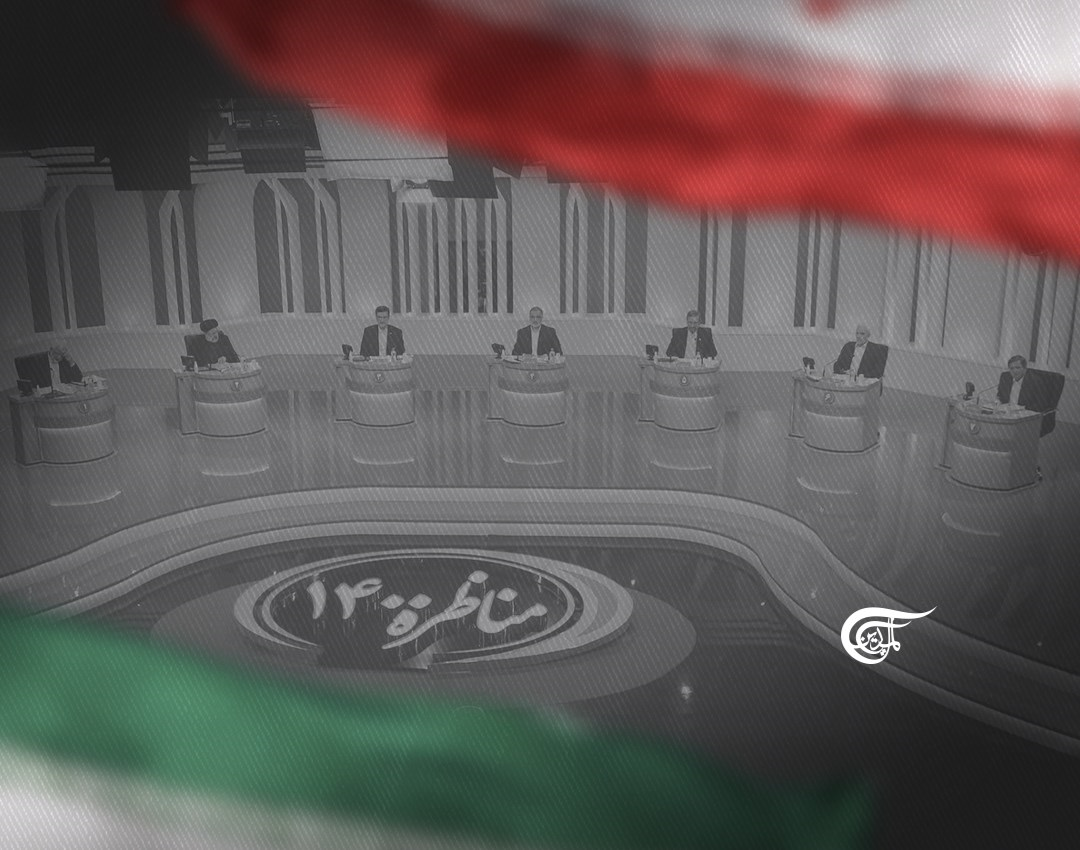Iran: second presidential debate
After exchanging attacks and criticism in the first presidential debate, the 7 presidential candidates took on a less intense character in the second debate, discussing internal issues.
-

The second Iranian presidential debate
The second presidential debate in Iran started Tuesday, and it focused on cultural, social, and political subjects. It was characterized by being less intense than the first debate, which witnessed a lot of accusations and arguments between the candidates. The second version was more organized in terms of questions and answers, with the candidates focusing on describing the internal problems in Iran and proposing solutions to them.
The following are the seven candidates' most prominent statements and positions in the second debate.
Raisi: Social Stratification Is The Result of Unfair Decisions
Candidate Ebrahim Raisi said, in response to a question relating to social stratification among the Iranian people and the solutions he proposes, "We must pay salaries equally, and positions and jobs should be fairly distributed among the spectrum of the people."
He stated that several reasons for social stratification are related to unfair economic decisions, saying that the system of control over production and consumption can be regulated, therefore reducing stratification.
Rezaee: My Project is to Eliminate Poverty in Iran
Candidate Mohsen Rezaee responded to a question on the "most pivotal issues after the (Islamic) revolution affecting the creation of problems in the labor sector, especially for the youth," by saying, "Your problems have economic reasons." He added, "We want to restore hope to the younger generation, especially that we heard their complaints on the current situation."
Rezai stressed that he would continue in the presidential elections until the very end.
He mentioned that the issue of justice and combatting poverty requires big decisions, indicating that his project for confronting poverty and achieving self-sufficiency among the various classes of society consists of five axes and aims to eliminate poverty in Iran.
Rezaee considered that the current situation "is worse than that during the war," indicating that the acting government has no project, as it changed its project three times in the first four years.
Rezaee asked, "Countries weaker than us were able to preserve the value of their national currency, so why were we not able to?"
Jalili: There Are Errors in Our Governmental Projects
Candidate Saeed Jalili answered a question regarding his election campaign and the decisions he will be taking to achieve the concept of a strong state by saying, "If we want people to trust us, we must change the behavior of officials." He explained that "there are errors in our country's procedural and administrative programs."
He also considered that "clarifying the result of the act without researching the process that led to it is a wrong policy," adding, "If people cannot see the results of the politicians' work, it is not helpful, and it means that your work was only illusion."
On women's role in society, Jalili said, "50% of the population is women, and during the past eight years, I have talked a lot about women and presented positions, but that did not achieve any results."
Hemmati: My Government Supports Those Most Affected
Candidate Abdolnaser Hemmati said, "I am the voice of the voiceless and the authority of those who are powerless because my government is supportive of the most affected individuals."
Hemmati criticized his opponent Jalili by saying, "Mr. Jalili says that we must not delay in any action or decision but he postponed, for two years, rejecting or accepting the issue of the FATF (Financial Action Task Force) treaty."
He mentioned that the matters related to the embargo were his government's priority. He announced that he "against detaining addicts," adding that "addiction stems from the lack of work and jobs and the government's wrong policies."
Ghazizadeh: The Youth Are The Foundation of My Government
Candidate Amir-Hossein Ghazizadeh Hashemi sees that one of the problems of the current administrative system is the way jobs and duties are divided, considering that the 'councours' (the government exams that determine student enrollment in universities according to their grades) should be eliminated.
According to Ghazizadeh, during Hassan Rouhani's administration, Iran witnessed a "remarkable rise in immigration, and the number of unemployed youths increased."
He added, "The peace government (the name of his government) will work on family and youth issues. The main actors in this government will be young people."
Ghazizadeh stressed that "we must include young people in all fields, and not let them flee the country." He also confirmed that he will establish research centers in order to activate nuclear sciences and include them in the country's new technology.
Zakani: A Big Portion of Our Problems Is Related To the Central Bank
Candidate Alireza Zakani said, "Our growth rate has become 0.8%, and this is a disastrous number. We have 3.5 million infertile couples." "My first decision will be to provide healthcare and social security to these young people, who want to have children and have not been able to," he added.
He indicated that a big portion of the country's problems are related to the central bank, saying that officials were juggling responsibilities in this matter.
He pointed out that the problems today are "the lack of justice compared to discrimination and corruption, and the demand for freedom compared to tyranny."
Mehralizadeh: What Candidate Raisi Put Forward Is Inapplicable
Candidate Mohsen Mehralizadeh saw that "Sayyed Raisi's demands to limit social stratification are not complete nor specialized." He indicated that, in this context, "We have 7 million heads of families who do not have a fixed salary. And at minimum, 3 million of them do not have a salary." And he said, "We must, at least, give those something through which they can secure their livelihood."

 6 Min Read
6 Min Read








